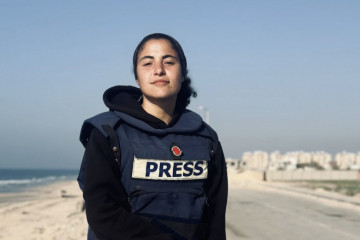

Earlier this year, a collection of entertainment professionals got together to write an open letter addressed to the National Academy of Television Arts & Sciences, urging them to rescind Palestinian journalist Bisan Owda’s Emmy nomination for her AJ+ documentary It’s Bisan From Gaza and I’m Still Alive.
Though this attempt failed spectacularly, as Bisan won the Emmy award last night for Outstanding Hard News Feature Story: Short Form, this speaks volumes about Hollywood’s attempts to dehumanise Arabs and Palestinians, and how audiences are finally looking past the tropes they have been fed for years.
The vilifying of Arabs, Muslims, and Palestinians in the entertainment industry is nothing new.
Since its inception, the industry has clung to stereotypes of men in keffiyehs being terrorists, and Muslim women being property, painting the Middle East as a land of sorrow and war.
Jack Shaheen goes into depth on this horrifying trend in his 2001 book, Reel Bad Arabs, How Hollywood Vilifies a People, which shows us how pervasive this problem truly is, dating back to the early 1900s, and gives us an idea of why so many in the industry refuse to accept Bisan’s reporting as the truth it clearly is.
History tells us that Bisan’s win last night couldn’t be possible, but what happened at the 45th annual News & Documentary Emmys says the tides are changing, at last.
“I was shocked, but maybe not surprised,” filmmaker Rolla Selbak shared when hearing the news of the 100+ entertainment individuals, including Selma Blair and Debra Messing, who tried to rescind Bisan’s nominations.
“The question is, do you know who you're attacking? Do you understand how insidious and evil you're making yourself look, like actually Disney villainous?”
The work that Bisan has done over the last 11 months has changed the way people have thought about Gaza, Palestine, and Arab/Muslim dominant countries, and has even landed her a Nobel prize nomination.
Her documentary, and her videos on social media in general, have destroyed the stereotypes that people thought of as truth.
However, the signatories of the open letter sought to associate Bisan with the Popular Front for the Liberation of Palestine, a political movement deemed as a “terrorist organisation” by many Western countries, including the United States, because they can’t seem to shake the tropes they were raised on themselves.
To them, Bisan propels the nasty ideas of terrorism, but to the world of viewers who actually listened to what she had to say, she has completely shattered them.
In a way, it’s vindicating to see audiences react to the attempt to silence Bisan as the blatant racism it is, with the internet abuzz with outrage from all over.
But as Rolla reminds us, “I feel like the outrage wasn't from within Hollywood, the outrage was from outside of Hollywood. Where was the outrage within Hollywood? Where are all the artists? Where are all the stars? Where's all the celebrities?”
While audiences and people outside of the industry rally up support for Bisan and her nomination and throw tomatoes at the likes of Messing and Blair, their colleagues are stone silent.
The vast majority of celebrities, actors, writers – everyone, really – have refused to say anything to defend the Palestinian people, and it once again reminds us of the cognitive dissonance required to be successful in an industry like Hollywood.
“There's a complete disconnect with what it means to be human,” Rolla says.
“I think Hollywood is completely disconnected from humanity. I think less and less people are caring about Hollywood movies or what Hollywood is actually producing."
The filmmaker adds: "More people care about what they're seeing, the stories they're seeing on social media, the stories that people are putting out on YouTube independently.”
As Hollywood continues to lose all of its creativity in favour of reboots, remakes, and strictly only making content out of existing intellectual property (IP), audiences are finding more meaningful work by storytellers like Bisan.
“I think people are more interested in truth versus something manufactured, and they're starting to really understand what the difference is,” Rolla explains.
So, what can we do?
If it’s clear that audiences are siding with Bisan and we want to see perspectives that truly matter, instead of buying another set of tickets to yet another Disney remake or reboot, how do we get Hollywood to meet us where it matters?
We have to hit these corporations where it hurts most: Their wallets.
"As consumers, we have the power,” Rolla continues.
“We are the ones who signal to Hollywood what we want to see, what we don't want to see, what we are morally with and what we are not. So I would say, number one, boycott any movies or TV shows that are doing injustice to really, to anyone.
"Don't watch it. Don't give your money to it, don't support it."
She adds, "And on the other hand, if you do know of Palestinian filmmakers or creatives or writers, definitely support their work by watching it, by putting your consumer power behind them and letting them know that you support what they're doing and that you love what they're doing.”
It’s clear that Hollywood is behind the times, but the good news is that the people who really have the power are ahead of them.
The power of boycotting has shown us what the people are capable of when you look at Starbucks and McDonalds, and Hollywood is no different.
There may be a massive disconnect between Hollywood and humanity today, but if we ban together again, it’s only a matter of time before the next Emmys or Oscars are filled with Palestinian storytellers finally getting their dues.
Tariq Raouf is a Palestinian-American Muslim writer, based in Seattle
Follow them on X: @tariq_raouf




 Follow the Middle East's top stories in English at The New Arab on Google News
Follow the Middle East's top stories in English at The New Arab on Google News


